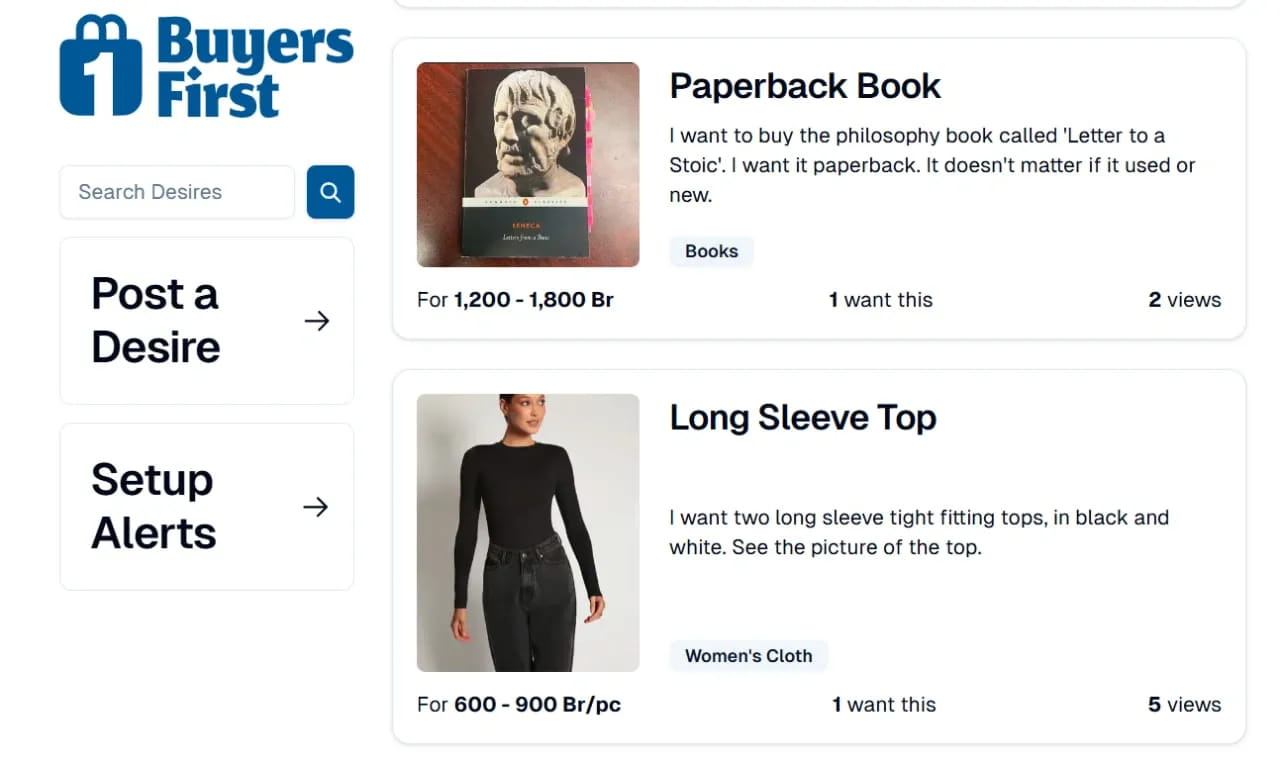Progress for 0 ad
Progress for 1 ad
Progress for 2 ad
Progress for 3 ad


A new platform looks to put a fresh spin on the local e-commerce landscape with a customer-centric hub tailored to meet niche buyer demands. Yoseph Tenaw, a software engineer and an Addis Ababa Science and Technolgy University alumnus, launched Buyer First to address longstanding challenges seen in the market.
Frustrated by the difficulty of finding unique or specialized products online, Yoseph set out to build a solution that empowers both buyers and sellers.
Inspired by the format of Stack Overflow, a popular question-answer site for programming-related topics, Buyer First flips the traditional e-commerce model on its head. Instead of sellers listing products, buyers post their specific needs or desires. Sellers who can fulfill these requests then compete to offer the best solutions.
“This approach not only saves buyers time and energy but also ensures they receive competitive prices,” Yoseph told Shega.
To use the platform, users must create an account. Once registered, buyers can post what they’re looking for, while sellers receive SMS alerts for matching requests. Sellers then bid to fulfill these requests, and upon acceptance of an offer, contact information is exchanged to finalize the transaction. This reverse marketplace model enhances buyer control and provides sellers with better sales opportunities, according to Yoseph.
“This demand-driven approach and alert system makes Buyer First stand out,” he stressed.
Launched in August this year after three months of development, Buyer First has already attracted 105 users, with 30 posts made and 15 successful matches. The platform averages around 20 unique page views per day. Despite facing challenges like marketing and SMS delivery, Yoseph managed to launch Buyer First with a modest investment of only 20,000 birr.
The platform’s planned instant SMS alerts aim to ensure that sellers get notified of relevant opportunities, while buyers can choose from multiple offers. This provides competitive pricing and fast responses.
Yoseph expects the platform to address several pain points in the e-commerce industry by helping buyers find niche products, often at low prices, while granting sellers wider market access and direct reach to their potential customers.
Although still in its early stages and not yet monetized, the platform is exploring various revenue strategies. These include allowing sellers to rent virtual shop spaces for enhanced visibility, acting as a middleman for secure transactions, offering paid features for item promotions, and providing subscription-based SMS alerts for targeted opportunities.
“My goal is to have a platform that becomes a household name like the late Qefira or Jiji and transform the traditional e-commerce paradigm,” Yoseph stated.
Most e-commerce platforms in Ethiopia struggle to maintain operations, with a recent report showing that nearly 58% of e-commerce startups have annual revenues and transaction volumes less than 10,000$.
However, the imminent commencement of operations by multinationals like AliExpress and innovative startups could signal a new wave.
Globally, there are several demand-driven or reverse marketplace platforms in the e-commerce sector where buyers post specific requests, and sellers compete to fulfill those needs.
👏
😂
❤️
😲
😠

Etenat Awol
Etenat holds a degree in Journalism and her master's in Public Relations. Previously, she served as a university lecturer and has five years of experience in communications, media, digital marketing, and consulting.
Your Email Address Will Not Be Published. Required Fields Are Marked *